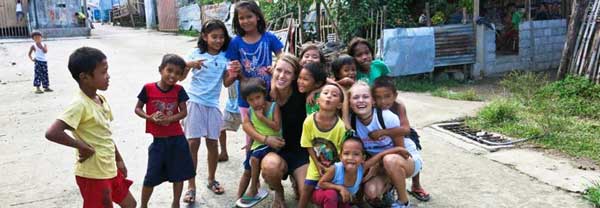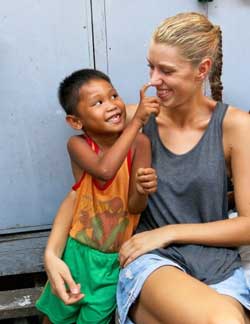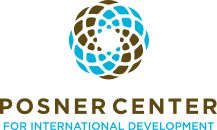Philippines Nutrition

Q and A with Alexia
Alexia, a young woman from Switzerland, spent three months with ELI Abroad, working with The Nutrition Project on the island of Leyte. Now that she’s back home she has graciously shared her impressions. Thank you Alexia!
 What did you hope to accomplish with your internship?
What did you hope to accomplish with your internship?
I did a gap year with the objective of improving my English, traveling, discovering new cultures and meeting people. I had been to Asia before, so I knew what to expect, and I planned to study nutrition. So volunteering with The Nutrition Project in the Philippines was for me the perfect way to combine traveling, helping, meeting people, and discovering a new culture.
Were you able to accomplish it all with the ELI program?
Totally! I became immersed in the Filipino culture in a way I never experienced before. I lived at a different pace of life, and I learned a lot from the Filipino lifestyle and culture. I even learned to cook for kids, something I did not expect when I applied, but it was such a great experience!
What was your housing situation like?
I lived with a lovely family. My "nanay" was really careful and did everything to make my stay perfect. I ate better than in a restaurant and she taught me how to cook Filipino food, so I could then make it for my kids at my internship placement :-)
There were two children in my host family, the girl was around my age and we got on very well together. She showed me around town and we went out with her friends. We also traveled together during some weekends. We went to Kalanggaman Island, a wonderful place I recommend to visit!
There were often many people in the house, the other members of the family would visit frequently… It was very lively :)
I had my own room. The shower consisted in taking a bucket bath, but I got used to it quickly, it is refreshing and even a real pleasure after a long hot day. I really felt at home :)
Did you meet and work with other volunteers?
Yes! I met some great people from around the world. We’d spend time together in the afternoons after work, or traveling on the weekends. It is nice to be with people who share the same experience. And when sometimes it was a little hard dealing with the culture, work or even the weather, it was really nice to find support among the other volunteers. Some have become close friends, and I plan to see them again.
Describe your typical day, from the moment you got up.
I got up at 7, usually before my alarm clock because of the roosters or the pigs ;-) and then I ate my breakfast. We always had the best mangos ever! Then I’d meet with another nutrition intern and we’d go to the center at about 8 o’clock. By then, I’d already decided what I wanted to cook for the kids.
We’d go to the market where we’d buy all the food based on our allotted budget, which was really limited. Often, we added some of our own money. It was not easy to bargain at the market because of our white skin, but with a big smile we could obtain affordable prices ;-).
Then we’d head to the project, which serves almost 1,000 people in need, many of them homeless and living in shelters due to widespread destruction after the super-typhoon Yolanda (Haiyan) hit the region in 2013.
Our job involved feeding malnourished preschool kids and raising awareness among the mothers about the importance of a balanced diet. The kids ran to us every morning shouting our names and holding our hands: a wonderful greeting!
We had one gas stove and spent the morning cooking a meal that was served about 12 o’clock. Everybody participated in the preparations, the children helped to chop the vegetables and to wash the dishes and the mothers helped us to cook the Filipino way.
We usually ate our lunch there, too.
Afternoons were free, and we could do whatever we wanted. Sometimes we did more work at the project, but we also had time to explore the city, to go to the swimming pool and even search for AC at the shopping malls.
What was your favorite thing about your internship?
The people I met. My host family, the friends and the kids of my project. These people were very grateful to us and it was so nice to gain the confidence of all these children. We shared loads of memorable moments. I saw the most wonderful smiles I have ever seen. I even came back to Tacloban after a month traveling around the Philippines. I really needed to see them all again before going home for good.
What was most difficult?
It was difficult to face the poverty and all these undernourished children. We could not feed everyone because of the small budget and it is hard to refuse someone who asks for food. We experienced some frustration sometimes, yet learned you have to go along with the Filipino way of doing things. You have to accept that you can have a positive impact but you cannot radically change things. It was hard to accept that my placement was temporary.
The heat was also something difficult to handle. I’m not used to such temperatures and sometimes it was exhausting. After a few weeks, all the volunteers came to love shade more than the sun!
What did you learn through your experience?
I learned that even though we are tiny in this world, we can make a small difference just by giving some of our time and skills. Everybody can volunteer and contribute, we just need to choose to spend some time working for others rather than for ourselves. In the end, I realized that the Filipino people gave me as much as I gave to them: it’s a real sharing.
I learned so much, about myself, the world… Volunteering is a life lesson that will change the way you live. It’s very impactful.
I also learned a different notion of time, how to live at a different pace.
I learned the importance of being patient and finding a way to relax.
I learned about optimism and the strength to start over. More than one year after the typhoon, the Filipino people are still rebuilding their lives. They keep moving forward!
And finally, I learned that happiness is not defined by what you have; it’s a choice. Human relationships are of an inestimable value. I learned we are happier with fewer superfluous things, and about the freedom you gain from having fewer possessions.
Do you think you will be able to use your experience for school or work?
This internship taught me less about nutrition per se, and more me about managing a nutrition project. And that’s very, very important. But I also learned how to cook well balanced Filipino meals.
Anything else you would like to add about your time in the Philippines?
It’s really a great lifetime experience: everyone should try it. You’ll learn how to deal with some hard realities and manage difficulties as part of your daily routine.
The Filipino people are lovely and have so much to share. I will be back there for sure!
Interviews
- ARGENTINA - HIV
- BRAZIL - Wildlife
- BRAZIL - Wildlife
- CAMBODIA - Buddhist Monks
- CAMBODIA - Children
- CAMBODIA - Microfinance
- CHILE - Literature
- CHILE - Equine Therapy
- CHINA - Journalism
- CHINA - Urban Planning
- ECUADOR - Medical
- ECUADOR - Teaching
- ECUADOR - Physical Therapy
- ECUADOR - Veterinary
- ECUADOR - Youth
- GHANA - Orphanage
- GUATEMALA - Teaching
- INDIA - Women's Programs
- INDIA - Health & Youth
- INDIA - Journalism
- INDIA - Women's Empowerment
- IRELAND - Art Gallery
- IRELAND - Art
- IRELAND - Law
- IRELAND - Museums
- IRELAND - PR
- IRELAND - Veterinary I
- IRELAND - Veterinary II
- MEXICO - Youth
- NEPAL - Construction
- NEPAL - Orphanage
- NEPAL - Orphanage
- NEPAL - Veterinary
- NICARAGUA - Teaching
- NICARAGUA - Unwed Mother Support
- PERU - Teaching
- PHILIPPINES - Nutrition
- PHILIPPINES - Nutrition
- PORTUGAL - Fighting Food Waste
- PORTUGAL - Housing for the Poor
- SOUTH AFRICA - Public Health
- SOUTH AFRICA - Public Health
- SOUTH AFRICA - Engineering
- SOUTH AFRICA - Nutrition
- THAILAND - Elephant Camp
- THAILAND - Elephant & Medical
- THAILAND - Journalism
- THAILAND - Physical Therapy
- UGANDA - Medical
- UGANDA - Medical
- UGANDA - Medical
- UGANDA - Microfinance
- VIETNAM - Pharmacy
- VIETNAM - Women

